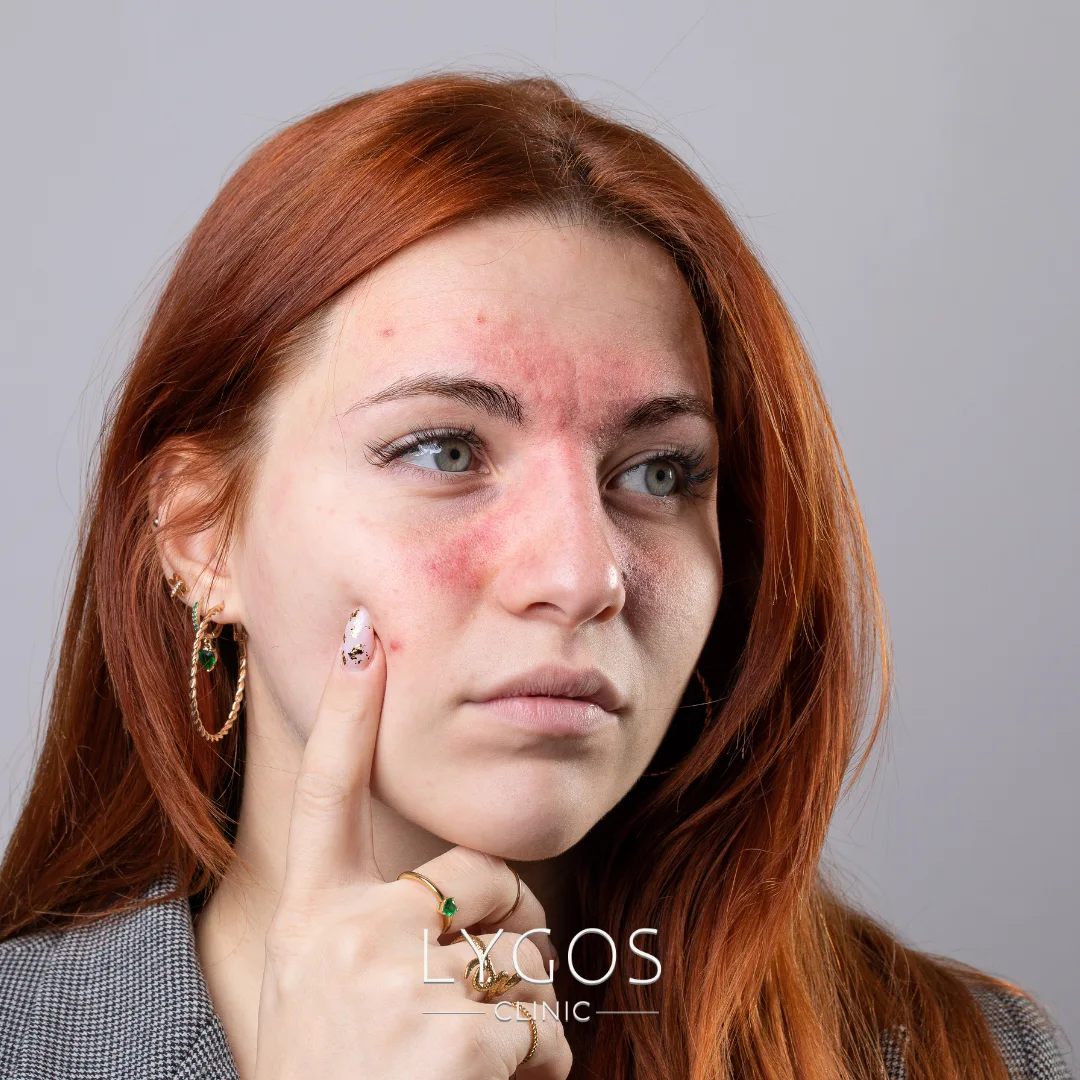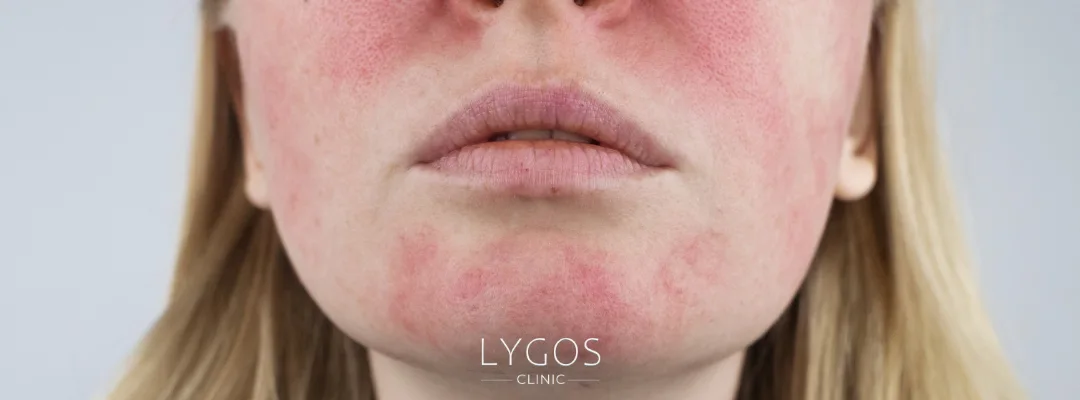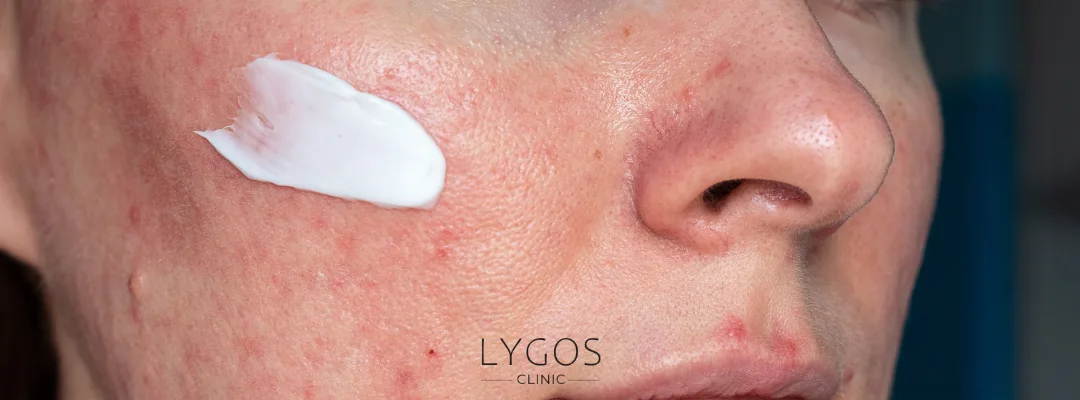What is Rosacea? | Why Does Rosacea Occur?

Chose Your Topic
What is Rosacea? Why Does Rosacea Occur?
Rosacea is a chronic skin condition characterized by redness, dilated blood vessels, and pimple-like inflammatory lesions. The question “What is rosacea?” is frequently researched, as it typically manifests with redness and sensitivity, particularly on the face.
The exact cause of rosacea is unknown, but genetic predisposition, an overactive immune response, and environmental factors are believed to play a role. Another answer to the question “What is rosacea?” is that it is a manageable but not completely curable skin disorder.
This article will cover all the essential details, including what rosacea is, its symptoms, causes, and treatment options.

What is Rosacea? What Are Its Symptoms?
What is rosacea, and what symptoms does it cause? Let’s examine these in detail:
- Persistent Redness (Erythema): Redness appears mainly on the nose, cheeks, chin, and forehead.
- Inflammatory Pimples: Small, acne-like, inflamed lesions may develop.
- Dilated Blood Vessels: Thin red lines appear in certain areas due to widened capillaries.
- Burning and Stinging Sensation: The skin becomes sensitive, leading to warmth, burning, or stinging sensations.
- Eye Issues: Redness, itching, and irritation in the eyes may occur.
To better understand the answer to “What is rosacea?”, let’s look at its different types.
What Are Rosacea Types?
For those wondering about the different types of rosacea, there are four main types:
- Erythematotelangiectatic Rosacea: Characterized by redness and dilated blood vessels.
- Papulopustular Rosacea: Features acne-like pimples and pustules.
- Phymatous Rosacea: Causes skin thickening, often leading to nose enlargement (rhinophyma).
- Ocular Rosacea: Causes dryness, redness, and irritation in the eyes.
For an accurate diagnosis of rosacea and its types, consulting a dermatologist is essential.
Why Does It Occur?
The causes of rosacea include:
- Genetic Predisposition: People with a family history of rosacea are at higher risk.
- Immune System Reactions: The body may overreact to external factors, causing inflammation.
- Blood Vessel Dilation: Enlarged blood vessels can lead to facial redness.
- Environmental Factors: Sun exposure, wind, and extreme temperatures can trigger the condition.
After exploring the causes of rosacea, let’s move on to its treatment options.

How Is Rosacea Treated?
Rosacea can be managed with the following treatments:
- Topical Creams: Antibiotic-containing creams may help alleviate symptoms.
- Oral Medications: Doctors may prescribe antibiotics or immune-modulating drugs.
- Laser Therapy: Helps reduce the appearance of dilated blood vessels.
- Skin Care: Using gentle cleansers and moisturizers designed for sensitive skin is recommended.
If you’re wondering whether rosacea can be alleviated naturally, lifestyle changes may help.

Are There Natural Remedies?
Natural ways to manage rosacea include:
- Sun Protection: Use SPF 30+ sunscreens.
- Stress Management: Activities like yoga and meditation can help.
- Dietary Adjustments: Avoid spicy foods, alcohol, and hot beverages.
- Cool Water Use: Avoid washing your face with excessively hot water.
While natural remedies won’t cure rosacea, they can help manage symptoms.
Can It Be Prevented?
Rosacea cannot be completely prevented, but its severity can be minimized by:
- Wearing hats and sunglasses to avoid direct sunlight.
- Protecting the skin from extreme heat and cold.
- Following a balanced diet and avoiding trigger foods.
- Using skincare products with soothing and gentle ingredients.
The answer to “Is rosacea permanent?” is that it is a chronic condition, but with proper care and treatment, symptoms can be controlled.
What is Rosacea Frequently Asked Questions (FAQ)
Rosacea is a chronic skin condition that manifests with redness, dilated blood vessels, and pimple-like inflammatory lesions, typically affecting the face.
No, rosacea is not contagious. It cannot be transmitted from person to person.
There is no permanent cure for rosacea at this time. However, its symptoms can be controlled with appropriate treatments.
Rosacea is most commonly seen in people aged 30-50, although it can start at any age.
Environmental factors such as sunlight, cold and hot weather, stress, alcohol, spicy foods, and hot beverages can trigger rosacea.


